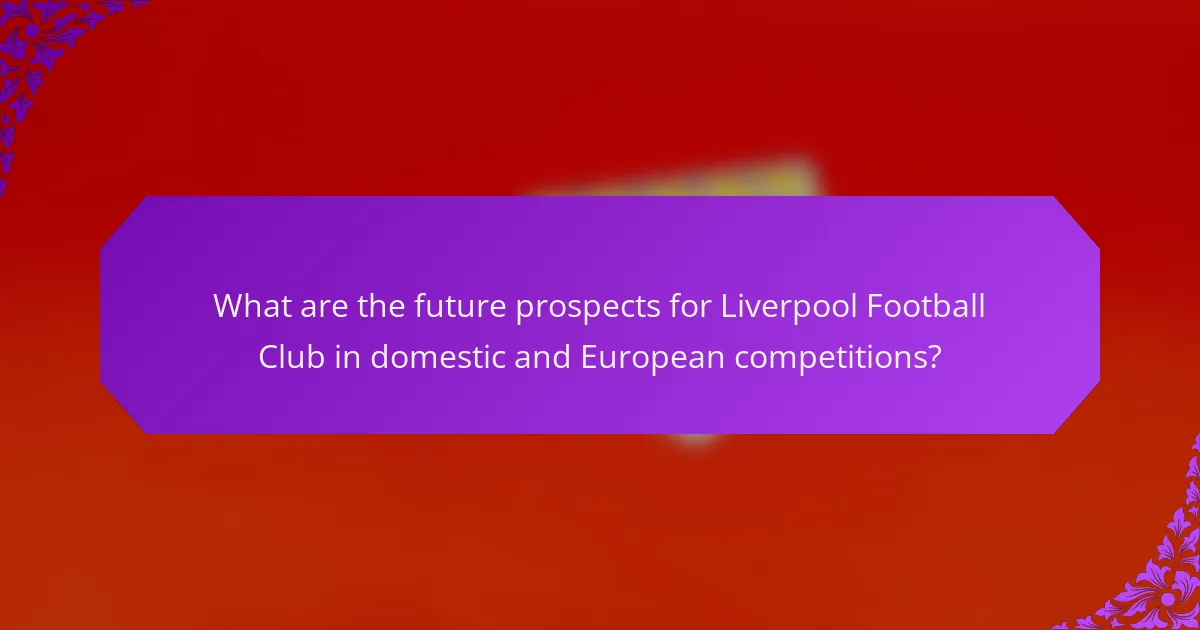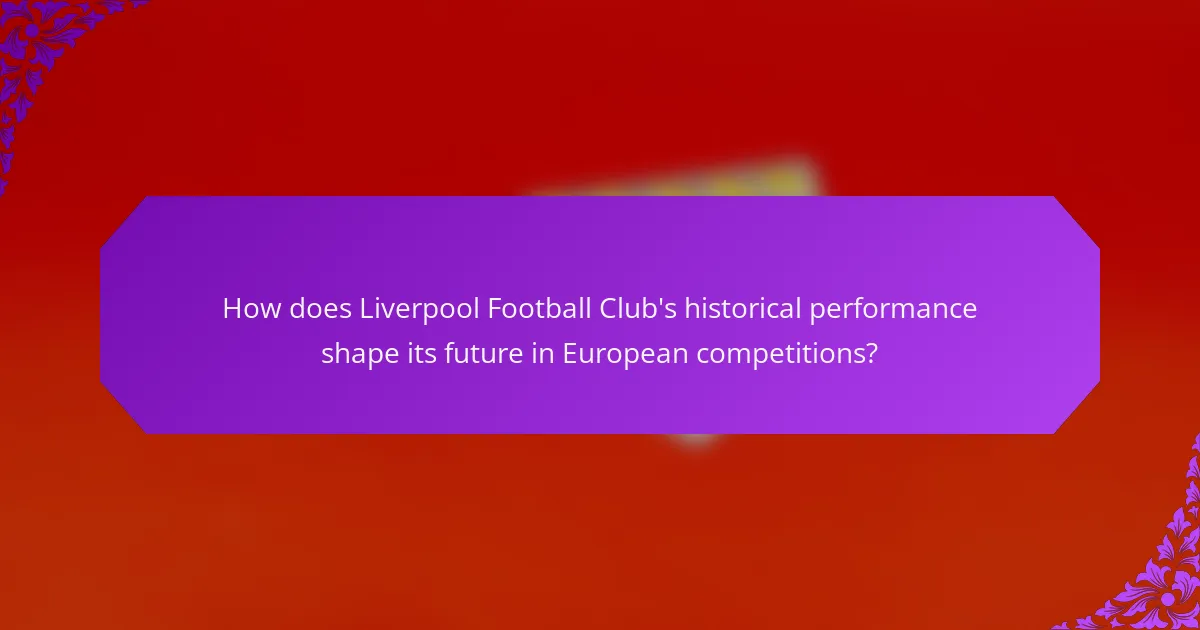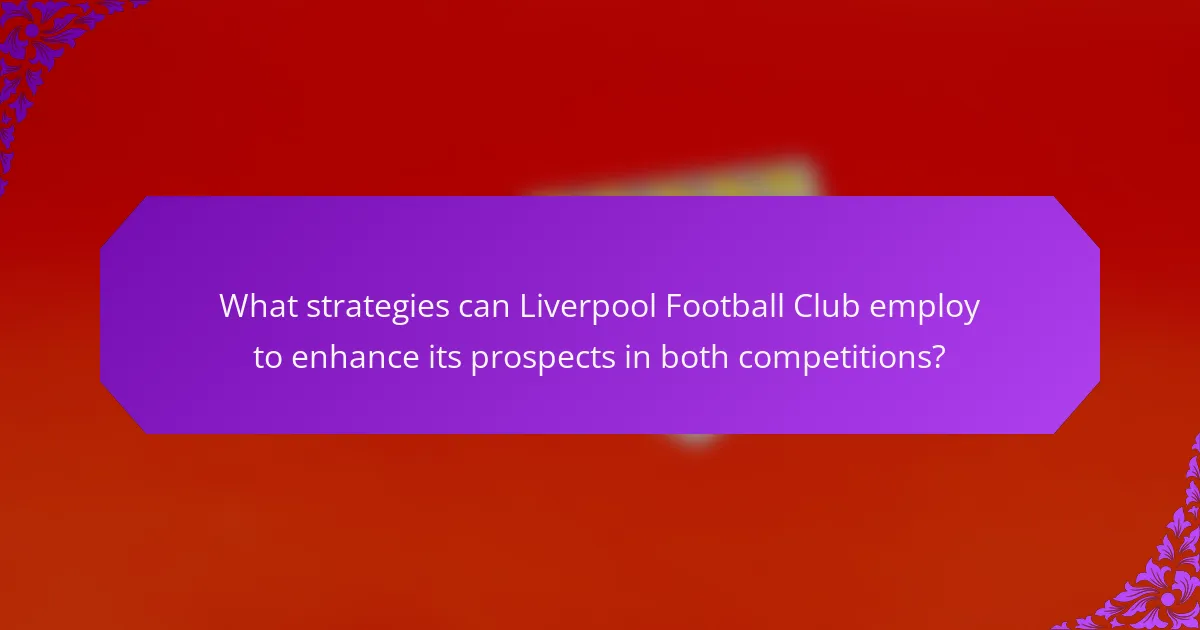Liverpool Football Club is positioned favorably for future success in both domestic and European competitions. The club boasts a talented squad featuring key players such as Mohamed Salah and Virgil van Dijk, alongside a strong history of participation in UEFA tournaments, including winning the Champions League in 2019. Liverpool’s strategic focus on youth development, squad depth, and financial stability enhances its competitive edge. Additionally, the club’s passionate fan base contributes to a significant home advantage, while data analytics and tactical preparation support optimal performance. Overall, Liverpool’s historical achievements and current strategies lay a solid foundation for continued success in the football landscape.

What are the future prospects for Liverpool Football Club in domestic and European competitions?
Liverpool Football Club’s future prospects in domestic and European competitions appear promising. The club has a strong squad with talented players like Mohamed Salah and Virgil van Dijk. They have consistently qualified for UEFA competitions, showcasing their competitiveness. Liverpool won the UEFA Champions League in 2019 and reached the final again in 2022, indicating their capability to perform at high levels. Domestically, they secured the Premier League title in 2020, ending a 30-year wait. Their investment in youth development and strategic signings bolster their long-term potential. The club’s solid financial base also supports future growth and competitiveness.
How has Liverpool Football Club performed in recent domestic competitions?
Liverpool Football Club has shown competitive performance in recent domestic competitions. In the 2022-2023 Premier League season, they finished fifth, securing a spot in the UEFA Europa League. They reached the FA Cup fourth round but were eliminated by Brighton. In the EFL Cup, Liverpool advanced to the quarter-finals before being knocked out by Manchester City. Overall, their domestic form has been inconsistent, with notable wins and disappointing losses throughout the season. This performance reflects challenges in maintaining their previous top-tier status in English football.
What are the key statistics from Liverpool’s recent domestic seasons?
Liverpool Football Club has shown strong performance in recent domestic seasons. In the 2020-2021 Premier League season, they finished third with 69 points. The 2021-2022 season saw them finish second, accumulating 92 points. In the 2022-2023 season, Liverpool finished fifth, earning 67 points. They recorded 22 wins in the 2021-2022 season, which was their highest in recent years. The club achieved a total of 75 goals in the 2021-2022 season, showcasing their attacking strength. Defensively, they conceded 26 goals in the same season, highlighting a solid backline. Liverpool also reached the FA Cup final in 2022, winning the title against Chelsea. These statistics reflect Liverpool’s competitive standing in domestic football.
How have player performances influenced Liverpool’s domestic results?
Player performances have significantly influenced Liverpool’s domestic results. Key players like Mohamed Salah and Virgil van Dijk have consistently delivered high-level performances. Salah’s goal-scoring ability has directly contributed to match victories. For example, in the 2021-2022 season, he scored 23 goals in the Premier League. Van Dijk’s defensive skills have strengthened the team’s backline. His presence reduced the number of goals conceded, leading to better overall standings. Additionally, contributions from midfielders like Thiago Alcântara have improved ball control and distribution. This has allowed the team to dominate possession. Overall, individual performances have translated into collective success, impacting Liverpool’s league position and cup competitions.
What factors could impact Liverpool’s success in future domestic competitions?
Liverpool’s success in future domestic competitions could be impacted by squad depth. A strong bench allows for rotation during congested fixtures. Injuries to key players can severely limit performance. The tactical approach of the manager also plays a crucial role. Effective strategies can exploit opponents’ weaknesses. Financial stability affects transfer market activity. Investment in quality players can enhance the squad’s competitiveness. Additionally, youth development is vital for long-term success. Homegrown talents can provide both quality and cost-effectiveness. Lastly, fan support creates a positive atmosphere. A strong home advantage can influence match outcomes.
How does squad depth affect Liverpool’s chances in domestic leagues?
Squad depth significantly enhances Liverpool’s chances in domestic leagues. A deeper squad allows for rotation of players, reducing fatigue over a long season. This is crucial in maintaining high performance levels during congested fixture schedules. Injuries can occur frequently, and a well-rounded squad can mitigate the impact of key player absences. Liverpool’s historical success in recent seasons correlates with their ability to field strong substitutes. For instance, during the 2019-2020 season, squad rotation helped maintain their title challenge. Overall, robust squad depth is essential for consistent performance and competitiveness in domestic leagues.
What role does management play in Liverpool’s domestic competition strategy?
Management plays a crucial role in Liverpool’s domestic competition strategy. They are responsible for setting the team’s vision and objectives. The management team analyzes player performance and squad depth to optimize match tactics. They make strategic decisions on player transfers to strengthen the squad. Management also focuses on developing young talent through the academy. Effective communication between management and coaching staff is essential for success. Historical data shows that Liverpool’s management decisions have led to multiple domestic titles. Their approach has created a competitive environment that fosters success in domestic competitions.

How does Liverpool Football Club’s historical performance shape its future in European competitions?
Liverpool Football Club’s historical performance significantly influences its future in European competitions. The club has a rich legacy, winning six UEFA Champions League titles, which establishes a strong competitive reputation. This history attracts top talent and sponsors, enhancing financial stability. Liverpool’s consistent participation in European tournaments builds experience among players and coaching staff. Historical successes foster a winning mentality, motivating current players to strive for excellence. The club’s passionate fan base creates a formidable home advantage in European matches. Overall, Liverpool’s past achievements provide a solid foundation for future successes in European competitions.
What achievements has Liverpool Football Club made in European competitions?
Liverpool Football Club has achieved significant success in European competitions. They have won the UEFA Champions League six times. Their victories occurred in 1977, 1978, 1981, 1984, 2005, and 2019. Liverpool also secured three UEFA Europa League titles in 1973, 1976, and 2001. Additionally, they won the UEFA Super Cup four times, in 1977, 1984, 2001, and 2019. These achievements make Liverpool one of the most successful clubs in European football history.
How do past successes influence the club’s current European ambitions?
Past successes significantly influence Liverpool Football Club’s current European ambitions. The club’s rich history, including six UEFA Champions League titles, establishes a strong foundation and expectation for future success. This legacy boosts player morale and attracts top talent who aspire to be part of a successful tradition. Additionally, historical achievements enhance the club’s brand, increasing commercial revenue and investment in facilities and talent. The financial stability from past triumphs allows for strategic acquisitions and development of a competitive squad. Furthermore, the club’s reputation in Europe fosters a winning mentality, motivating players to perform at their best in crucial matches. Overall, Liverpool’s past successes create a powerful drive and framework for pursuing new European achievements.
What are the memorable moments that define Liverpool’s European legacy?
Liverpool’s European legacy is defined by several memorable moments. The club’s first European Cup triumph came in 1977 against Borussia Mönchengladbach. They won 3-1 in Rome, marking the start of their European dominance. In 1984, Liverpool secured their fourth European title by defeating AS Roma in a penalty shootout after a 1-1 draw. The 2005 Champions League final against AC Milan is iconic. Liverpool staged a remarkable comeback from 3-0 down at halftime to win 3-2 on penalties. This match is often referred to as the “Miracle of Istanbul.” In 2019, Liverpool won their sixth Champions League title by beating Tottenham Hotspur 2-0 in Madrid. These moments showcase Liverpool’s resilience and rich history in European football.
What challenges does Liverpool face in upcoming European competitions?
Liverpool faces several challenges in upcoming European competitions. Key challenges include squad depth, player injuries, and tactical adaptability. The team’s reliance on key players increases the risk of injury impact. Historical performance shows that injuries can derail a campaign, as seen in previous seasons. Additionally, the competitive nature of European tournaments requires strategic flexibility. Liverpool must adapt tactics to counter diverse playing styles. The pressure of high-stakes matches can also affect player performance. Lastly, maintaining consistency in form is crucial for progression. Inconsistent league performance may translate to challenges in Europe.
How do financial factors impact Liverpool’s competitiveness in Europe?
Financial factors significantly impact Liverpool’s competitiveness in Europe. The club’s revenue affects its ability to invest in top talent and infrastructure. Higher revenues allow for better player acquisitions and retention. In the 2021 financial year, Liverpool reported a revenue of £487 million. This financial strength enables the club to compete with European giants like Manchester City and Bayern Munich. Additionally, financial stability helps in attracting sponsorship deals and increasing matchday income. The club’s performance in European competitions also influences its financial standing, creating a cyclical effect. Successful campaigns lead to increased prize money and commercial opportunities.
What are the strengths and weaknesses of Liverpool’s current squad in European play?
Liverpool’s current squad has notable strengths and weaknesses in European play. One strength is their attacking prowess, highlighted by players like Mohamed Salah and Darwin Núñez. They have a strong record of scoring goals in the UEFA Champions League. Another strength is their tactical versatility under manager Jürgen Klopp, allowing them to adapt to different opponents and match situations.
However, weaknesses exist, particularly in defensive consistency. The squad has struggled with injuries to key defenders, impacting their overall stability. Additionally, their midfield depth has been questioned, particularly in high-pressure matches against top European teams. These factors can hinder Liverpool’s performance in crucial knockout stages of competitions.

What strategies can Liverpool Football Club employ to enhance its prospects in both competitions?
Liverpool Football Club can enhance its prospects in both domestic and European competitions by focusing on squad depth and player rotation. Maintaining a robust squad allows for better performance across multiple fixtures. Implementing a strategic rotation policy can minimize player fatigue during congested schedules.
Investing in youth development can provide fresh talent and reduce reliance on transfers. Utilizing data analytics to assess player performance can inform tactical adjustments and optimize match strategies.
Building a strong home advantage through fan engagement can boost team morale. Analyzing opponents’ tactics can help in preparing effective game plans.
Historically, teams with strong squad depth have performed better in competitions; for instance, Liverpool’s success in 2019-2020 was partly due to a deep squad. Prioritizing fitness and injury prevention will ensure key players remain available for crucial matches.
How can Liverpool improve its squad for future competitions?
Liverpool can improve its squad for future competitions by enhancing player depth and scouting talent. Strengthening the midfield is essential, as evidenced by their struggles with injuries in recent seasons. Investing in young, versatile players can provide both immediate impact and future potential. Analyzing performance metrics can help identify underperforming areas. Additionally, integrating advanced sports science can optimize player fitness and longevity. Historical data shows that clubs with robust youth academies often succeed. Liverpool’s previous success with players like Trent Alexander-Arnold highlights the value of homegrown talent. Overall, a strategic approach to recruitment and development will bolster their competitiveness.
What types of player acquisitions should Liverpool consider for success?
Liverpool should consider acquiring versatile midfielders, young talents, and experienced defenders for success. Versatile midfielders can adapt to various roles, enhancing tactical flexibility. Young talents provide long-term potential and can be developed into key players. Experienced defenders bring stability and leadership to the backline. Historical success often relies on a balanced squad with a mix of youth and experience. For instance, clubs like Manchester City have thrived by investing in a diverse player portfolio.
How can youth development contribute to Liverpool’s future success?
Youth development can significantly contribute to Liverpool’s future success by nurturing homegrown talent. Investing in youth academies enhances the club’s ability to produce skilled players. This approach reduces reliance on expensive transfers. Historical data shows that clubs with strong youth systems often achieve sustained success. For example, Liverpool’s academy has produced players like Steven Gerrard and Trent Alexander-Arnold. These players have contributed to both domestic and European victories. Furthermore, promoting youth players fosters a strong club identity and fan loyalty. Engaging local talent can also strengthen community ties, enhancing support for the club. Ultimately, a robust youth development strategy positions Liverpool for long-term competitiveness in football.
What role does fan support play in Liverpool’s competitive edge?
Fan support plays a crucial role in Liverpool’s competitive edge. The passionate fanbase creates an intimidating atmosphere for opposing teams at Anfield. This home advantage often translates to better performance during matches. Liverpool’s fans are known for their unwavering loyalty and vocal encouragement. Studies show that teams with strong fan support tend to perform better in crucial games. The famous anthem “You’ll Never Walk Alone” boosts player morale and unity. Historical data indicates that Liverpool has one of the highest win rates at home compared to other clubs. Overall, fan support significantly enhances Liverpool’s chances of success in both domestic and European competitions.
How can Liverpool engage its fanbase to boost morale and performance?
Liverpool can engage its fanbase to boost morale and performance through interactive events and social media engagement. Organizing fan meet-and-greets allows supporters to connect with players. Hosting open training sessions creates an inclusive atmosphere. Implementing fan voting on team kits fosters a sense of ownership. Utilizing social media for real-time updates keeps fans engaged. Encouraging fan feedback on club decisions strengthens community ties. These strategies have been shown to enhance team spirit and performance. For example, clubs that actively involve fans often report higher attendance and increased merchandise sales.
What are the best practices for Liverpool to maximize its potential in competitions?
Liverpool should focus on strategic player development and acquisition. Investing in youth academies can cultivate homegrown talent. This approach has historically produced players like Steven Gerrard and Trent Alexander-Arnold. Additionally, maintaining a strong scouting network ensures the club identifies potential signings early. Liverpool should also prioritize data analytics for performance improvement. This method has been successfully utilized by clubs like Manchester City. Implementing a robust sports science program can enhance player fitness and reduce injuries. Furthermore, fostering a positive team culture encourages unity and resilience. Engaging in regular tactical drills prepares the squad for various match situations. Lastly, effective management of player contracts ensures key players remain at the club. This strategy has been vital for retaining stars like Mohamed Salah.
Liverpool Football Club is the primary entity discussed, focusing on its future prospects in both domestic and European competitions. The article outlines the club’s strong squad, recent performance metrics, and historical achievements, highlighting key players’ contributions and management strategies. It examines challenges such as squad depth and tactical adaptability while emphasizing the importance of fan support and youth development. Additionally, the piece details potential strategies for enhancing competitiveness, including player acquisitions and maximizing engagement with the fanbase.
